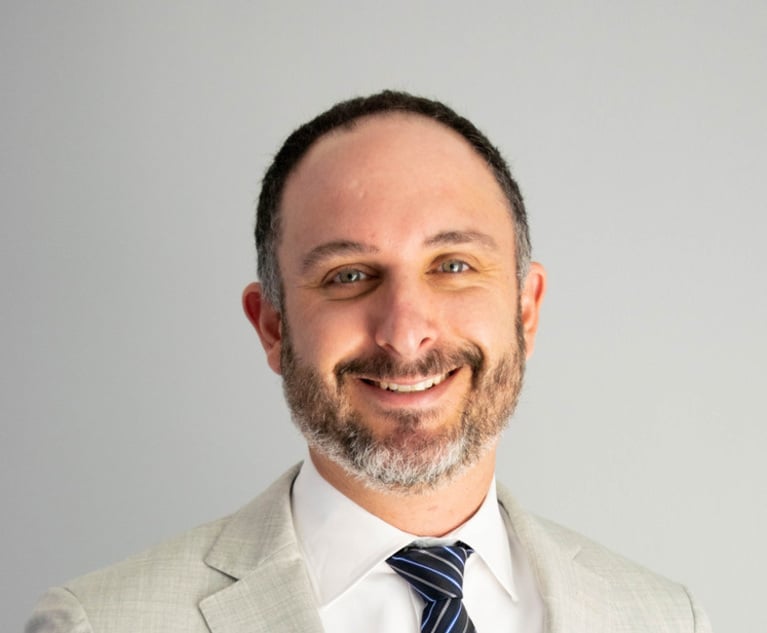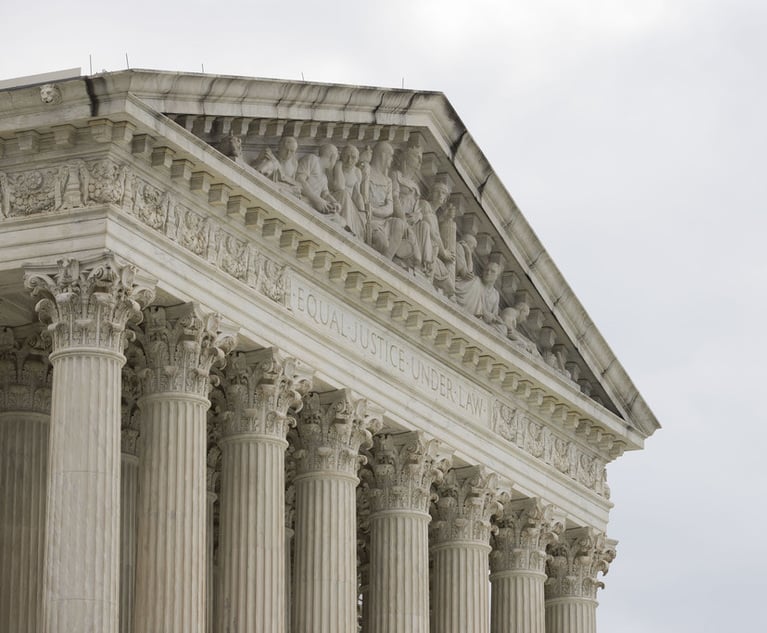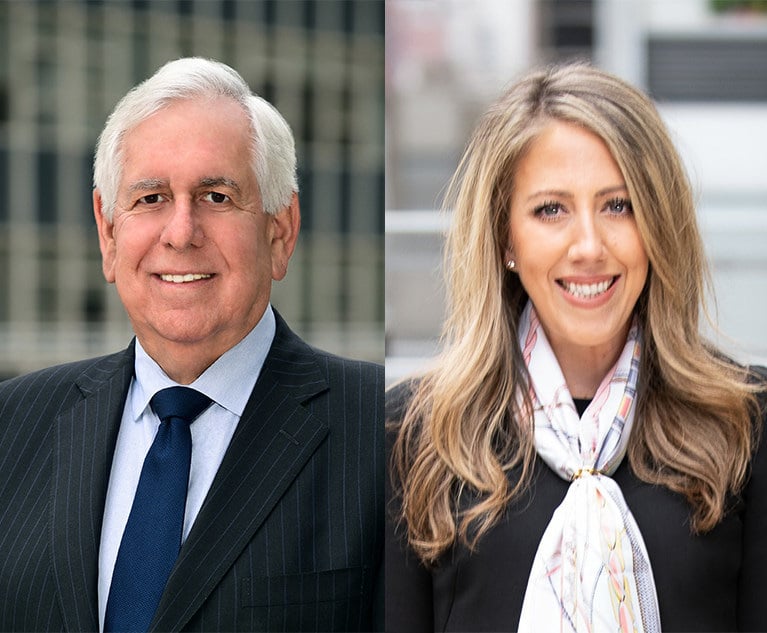'Masterpiece Cakeshop' and Sincerity of Beliefs: the Aftermath of 'Hobby Lobby'
William M. Pinzler discusses "Masterpiece Cakeshop and Jack Phillips v. Colorado Civil Rights Commission and Craig and Mullins," a case the Supreme Court has granted certiorari which presents the question of whether applying Colorado's public accommodations law to compel a "cake artist" (a baker) to prepare a cake in honor of a customer's gay wedding violates his "sincerely held religious beliefs" about gay marriage and thus violates the Free Speech or Free Exercise clause of the First Amendment.
September 13, 2017 at 12:00 AM
8 minute read
Three years ago, in Burwell v. Hobby Lobby Stores, 573 U.S. 22 (2014), the U.S. Supreme Court held that the Religious Freedom Restoration Act (RFRA) can be applied to closely held corporations whose owners have sincerely held religious beliefs. RFRA prohibits the government from substantially burdening a person's exercise of religion unless the government demonstrates that the application of that burden to that person is in furtherance of a compelling governmental interest and is the least restrictive means of furthering that compelling governmental interest. RFRA covers “any exercise of religion, whether or not compelled by, or central to a system of religious beliefs.” 42 U.S.C. §2000cc-5(7)(A). See Pinzler, “Hobby Lobby and Piercing the Corporate Veil,” N.Y.L.J. Sept. 4, 2014.)
Case Background
The Supreme Court has granted certiorari in Masterpiece Cakeshop and Jack Phillips v. Colorado Civil Rights Commission and Craig and Mullins. The question presented is whether applying Colorado's public accommodations law to compel a “cake artist” (a baker) to prepare a cake in honor of a customer's gay wedding celebration violates his “sincerely held religious beliefs” about gay marriage and thus violates the Free Speech or Free Exercise clause of the First Amendment.
David Mullins and Charlie Craig visited Masterpiece Cakeshop in July 2012, to order a cake for their upcoming wedding reception. Mullins and Craig planned to marry in Massachusetts and then celebrate with family and friends back home in Colorado. Masterpiece owner Jack Phillips informed them that because of his religious beliefs the store's policy was to deny service to customers who wished to order baked goods to celebrate a same-sex couple's wedding.
Long-standing Colorado state law prohibits public accommodations, including businesses such as Masterpiece Cakeshop, from refusing service based on factors such as race, sex, marital status or sexual orientation. Mullins and Craig filed complaints with the Colorado Civil Rights Division (CCRD) contending that Masterpiece had violated this law. The CCRD ruled that Phillips illegally discriminated against Mullins and Craig. In December 2013, an administrative law judge issued a decision confirming that finding. The baker appealed the ALJ's ruling to the Colorado Civil Rights Commission. The Commission's order affirmed previous determinations that Masterpiece's refusal to sell Mullins and Craig a wedding cake constituted discrimination on the basis of sexual orientation in violation of the Colorado Anti-Discrimination Act, brushing aside the baker's purported distinction between gay marriage, to which he was opposed, and homosexuality, to which he was not opposed.
This content has been archived. It is available through our partners, LexisNexis® and Bloomberg Law.
To view this content, please continue to their sites.
Not a Lexis Subscriber?
Subscribe Now
Not a Bloomberg Law Subscriber?
Subscribe Now
NOT FOR REPRINT
© 2025 ALM Global, LLC, All Rights Reserved. Request academic re-use from www.copyright.com. All other uses, submit a request to [email protected]. For more information visit Asset & Logo Licensing.
You Might Like
View All
For Safer Traffic Stops, Replace Paper Documents With ‘Contactless’ Tech
4 minute read
Impact of New NYS Workers’ Compensation Work-Related Stress Relief on Discrimination Claims

Justices Will Weigh Constitutionality of Law Allowing Terror Victims to Sue PLO

Are New York City Housing Providers Ready for the Fair Chance for Housing Act?
10 minute readTrending Stories
- 1Lawsuit alleges racial and gender discrimination led to an Air Force contractor's death at California airfield
- 2Holland & Knight Picks Up 8 Private Wealth Lawyers in Los Angeles
- 3Khan Defends FTC Tenure, Does Not Address Post-Inauguration Plans
- 4J.D. Vance Campaign Finance Challenge Leads December Supreme Court Petition Roundup
- 54th Circuit Revives Racial Harassment Lawsuit Against North Carolina School District
Who Got The Work
Michael G. Bongiorno, Andrew Scott Dulberg and Elizabeth E. Driscoll from Wilmer Cutler Pickering Hale and Dorr have stepped in to represent Symbotic Inc., an A.I.-enabled technology platform that focuses on increasing supply chain efficiency, and other defendants in a pending shareholder derivative lawsuit. The case, filed Oct. 2 in Massachusetts District Court by the Brown Law Firm on behalf of Stephen Austen, accuses certain officers and directors of misleading investors in regard to Symbotic's potential for margin growth by failing to disclose that the company was not equipped to timely deploy its systems or manage expenses through project delays. The case, assigned to U.S. District Judge Nathaniel M. Gorton, is 1:24-cv-12522, Austen v. Cohen et al.
Who Got The Work
Edmund Polubinski and Marie Killmond of Davis Polk & Wardwell have entered appearances for data platform software development company MongoDB and other defendants in a pending shareholder derivative lawsuit. The action, filed Oct. 7 in New York Southern District Court by the Brown Law Firm, accuses the company's directors and/or officers of falsely expressing confidence in the company’s restructuring of its sales incentive plan and downplaying the severity of decreases in its upfront commitments. The case is 1:24-cv-07594, Roy v. Ittycheria et al.
Who Got The Work
Amy O. Bruchs and Kurt F. Ellison of Michael Best & Friedrich have entered appearances for Epic Systems Corp. in a pending employment discrimination lawsuit. The suit was filed Sept. 7 in Wisconsin Western District Court by Levine Eisberner LLC and Siri & Glimstad on behalf of a project manager who claims that he was wrongfully terminated after applying for a religious exemption to the defendant's COVID-19 vaccine mandate. The case, assigned to U.S. Magistrate Judge Anita Marie Boor, is 3:24-cv-00630, Secker, Nathan v. Epic Systems Corporation.
Who Got The Work
David X. Sullivan, Thomas J. Finn and Gregory A. Hall from McCarter & English have entered appearances for Sunrun Installation Services in a pending civil rights lawsuit. The complaint was filed Sept. 4 in Connecticut District Court by attorney Robert M. Berke on behalf of former employee George Edward Steins, who was arrested and charged with employing an unregistered home improvement salesperson. The complaint alleges that had Sunrun informed the Connecticut Department of Consumer Protection that the plaintiff's employment had ended in 2017 and that he no longer held Sunrun's home improvement contractor license, he would not have been hit with charges, which were dismissed in May 2024. The case, assigned to U.S. District Judge Jeffrey A. Meyer, is 3:24-cv-01423, Steins v. Sunrun, Inc. et al.
Who Got The Work
Greenberg Traurig shareholder Joshua L. Raskin has entered an appearance for boohoo.com UK Ltd. in a pending patent infringement lawsuit. The suit, filed Sept. 3 in Texas Eastern District Court by Rozier Hardt McDonough on behalf of Alto Dynamics, asserts five patents related to an online shopping platform. The case, assigned to U.S. District Judge Rodney Gilstrap, is 2:24-cv-00719, Alto Dynamics, LLC v. boohoo.com UK Limited.
Featured Firms
Law Offices of Gary Martin Hays & Associates, P.C.
(470) 294-1674
Law Offices of Mark E. Salomone
(857) 444-6468
Smith & Hassler
(713) 739-1250






